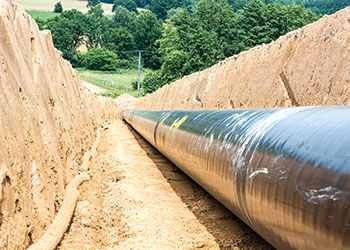
 Justet ... investing in TCP solutions
Justet ... investing in TCP solutions
The value proposition of thermoplastic composite pipes is three-fold; eliminating corrosion, reducing total installation costs, and reducing carbon footprint, Caroline Justet, Strohm’s Vice President for Europe, tells OGN
The potential impact of pipeline corrosion within the oil and gas industry can be devastating. From the increased cost of maintenance and replacing parts, to expensive offshore pipeline installation projects, and the huge costs due to loss of production, the consequences of oil spills and leakages from corroded pipelines are not to be understated.
Corrosion is considered to be the main cause of failure in the oil and gas production process and, due to the development of fields in deeper offshore wells with higher pressure, temperature, and higher levels of hydrogen sulphide (H2S), carbon dioxide (CO2), and chloride, corrosion costs are increasing.
Until a decade ago, steel material for pipelines and pipe structures was the main option for the oil and gas industry.
However, steel pipelines are heavy and their corrosion must be mitigated using coatings and inhibitors (such as amines and nitrites), thus increasing operating costs.
Now, Strohm is leading the development and deployment of its thermoplastic composite pipe (TCP) to counter the inherent drawbacks of steel: corrosion, fatigue, and rigidity.
REVOLUTIONARY SOLUTION
Strong, lightweight and corrosion resistant, TCP provides a wide variety of financial, operational, and environmental benefits in subsea production and oil field service applications.
"The value proposition that TCP has is three-fold: One is completely doing away with corrosion, two is the reduction in total installation costs, and the third, more recently added, is the reduction in carbon footprint," explains Martin van Onna, Strohm's Chief Commercial Officer, tells OGN energy magazine.
TCP features a solid pipe wall constructed from glass or carbon reinforcement fibres and thermoplastic polymeric materials.
The unique and proprietary melt-fusing manufacturing process results in a true composite structure, with the fibres fully embedded within a ductile polymer matrix and ensuring the strongest interface possible between the different pipe layers.
The fibres are linear in behaviour and typically do not show plastic deformation or yielding, whilst the ductile polymer matrix provides flexibility.
This combination creates a robust spoolable pipe, manufactured in long lengths, and adapted to customer-specific requirements.
For subsea applications Strohm provides an on-target weight coating to ensure stability on the seabed.
With continued investment in its growth and innovation from many global supermajors, the technology’s rapid journey from concept to commercialisation has ensured the company has the world’s largest track record. TCP has been installed in every offshore oil and gas region globally and with zero failures.
APPLICATIONS FOR ENERGY INDUSTRY
TCP is agnostic to fluids and gases and a viable and credible alternative for flowlines, risers, and jumper spools to support hydrocarbon production, water injection, chemical and methanol injection, wellbore access, choke and kill, (de-)commissioning and intervention activities.
 |
Strohm's TCP is light, spoolable and corrosion resistant |
Based on the application, the company selects the right polymer for the liner, matrix and coating and fibre to ensure it has the best fit-for-purpose solution for static as well as dynamic applications in shallow and deepwater offshore and subsea environments.
For flowlines for water or methanol injection for instance, the choice for the glass fibre in combination with polyethylene polymer provides the best solution for flexibility, stiffness, and minimum bend radius.
This solution reduces total installed cost not just in deepwater, but also in shallow water applications.
The fact that TCP can be installed using small vessels, and end-fittings installed offshore on small platforms, is a great advantage in brownfield, shallow water applications.
The technology can help enhance production, particularly for brownfield developments which need old pipelines replaced to enable continued production from maturing fields in regions such as the North Sea, West Africa, and Asia.
For deepwater, high pressure dynamic risers, the combination of carbon fibre with the high-end PVDF polymer is the best field proven solution in the context of install-ability using existing vessels, subsea stability, and configuration.
The company’s TCP Jumper provides ultimate flexibility for connecting subsea trees to manifolds and the like, whilst reducing cost dramatically and de-risking the client’s project schedules. Not requiring any metrology, the TCP Jumper outperforms rigid steel pipes and conventional unbonded flexible pipes by saving up to 50 per cent on overall investment and procurement costs.
Van Onna says: "TCP has completely removed the physiochemical parameters associated with the oxidation of steel in seawater, making it the definitive agnostic solution to CO2 induced corrosion and an industry game-changer. This lightweight, high-strength and corrosion resistant technology provides cost and operational benefits to operators in subsea production and oil field service applications."
THE TCP RISER
Strohm also designs and manufactures TCP Riser systems for hydrocarbon production, water and gas injection, gas lift, chemicals injection, and carbon capture and storage (CCS).
The company has launched a joint industry programme with Petrobras and Shell for its TCP Riser technology, which has the potential to revolutionise the deepwater flowline and riser market in Brazil and beyond with a corrosion-free solution that has a 30-year design life.
The TCP Riser is designed and developed specifically for the challenging pre-salt conditions in Brazil. The region’s prolific pre-salt provinces have some of the most productive wells in the world.
Typically, deepwater fields such as these, are produced through dynamic risers connected to floating production storage and offloading vessels. However, crude oil and natural gas in this region contain various corrosive contaminants such as CO2 and H2S, which, especially when dissolved in water, create an extremely corrosive mixture.
Recently, conventional flexible flowline and risers have been reported to exhibit premature integrity issues due to corrosion, leading to regular replacement which is costly and leads to deferred production.
The high concentration of CO2 is thought to have caused the accelerated corrosion and, ultimately, the failures of these flexible pipes, a phenomenon commonly known as stress corrosion cracking (SCC).
This type of corrosion is highly chemically specific and the chemical environment that causes SCC for a given metal can often be only mildly corrosive to the metal.
Hence, metal parts with severe SCC can appear bright and shiny, while being filled with microscopic cracks, thus making it common for the damage to go undetected prior to failure.
The full, solid wall TCP Riser takes corrosion completely out of the equation by removing the steel tensile armour layers and replacing them with a carbon fibre based composite.
The design of the TCP Riser includes an inner liner, a carbon fibre based composite layer, a coating, and a weight coating.
The liner, matrix and coatings are based on the PVDF polymer, proven in the oilfield for many years of service life. The carbon fibre is completely insensitive to CO2 and H2S, and has a superior fatigue performance.
The weight coating was designed specifically to reduce the deflections in a free hanging catenary configuration that could be imparted by high current profiles across the water column, as well as to provide the right ballast during installation.
The TCP Riser’s stiffness, bending radius and submerged weight was tuned through the pipe design and weight coating, to arrive at the most optimal configuration balancing stability, weight, and cost.
The TCP Riser is subjected to a robust qualification programme, which can help function as a solid for deepwater applications.
Last year, Strohm, in partnership with Evonik, DNV, and the Netherlands Aerospace Centre (NLR), completed an intensive five-year investment and testing programme to develop and qualify Evonik’s unidirectional Carbon Fibre PA12 (PA12) tape for TCP applications.
Following the programme, DNV attested that PA12 was fit for use in dynamic sweet and sour hydrocarbons, water, and gas injection applications according to DNV-ST-F119.
PA12 is a fully non-metallic, corrosion-resistant solution. Due to the use of carbon fibres, it is exceptionally resistant to fatigue-based failures, marking it a perfect choice for any dynamic application from jumpers to flowlines and small bore risers, including sweet and sour hydrocarbon, water, and gas service.
However, the testing of product prototypes in real life conditions in the actual environment is absolutely key, and the deepwater riser programme that Strohm is embarking on with Petrobras and with Shell Brazil, achieves just that. As part of the programme so implemented, two product prototypes were installed in a pre-salt field in Brazil, thereby crossing the bridge from what started as a journey over ten years ago, to reality.
SUSTAINABILITY IS THE FUTURE
Carbon steel structures exposed to natural waters and corrosive environments generally corrode at an unacceptably high rate unless preventive actions are taken.
An estimated one-sixth of all steel production worldwide is used to replace corroded metal, much of it at cooling water piping systems, and yet the rate of corrosion in pipelines is increasing and becoming more difficult to overcome.
Strohm’s materials are well positioned to maintain the oil and gas sector and support the energy transition industries. They can handle gases including hydrogen and CO2 which are both corrosive and present many challenges for steel.
The firm’s deepwater risers can also be used to inject CO2 into subsea reservoirs which can help companies in the CCUS space reduce their costs as CO2 doesn’t need to be purified for TCP usage.
With a growing list of operators announcing ambitions to reduce the carbon footprint of their operations and the products they sell, the oil and gas industry is taking unprecedented steps towards a lower carbon energy system.
"We have been investing in the development of TCP solutions aimed at the hydrocarbons, hydrogen, and carbon, capture, utilisation and storage (CCUS) markets, aiming to drive long-term value for our clients. Unlike steel or unbonded flexible pipes, TCP does not corrode when exposed to CO2 and it does not become brittle with exposure to hydrogen. It is a more sustainable product and is proven to be durable for over 40 years," says Van Onna.








































































